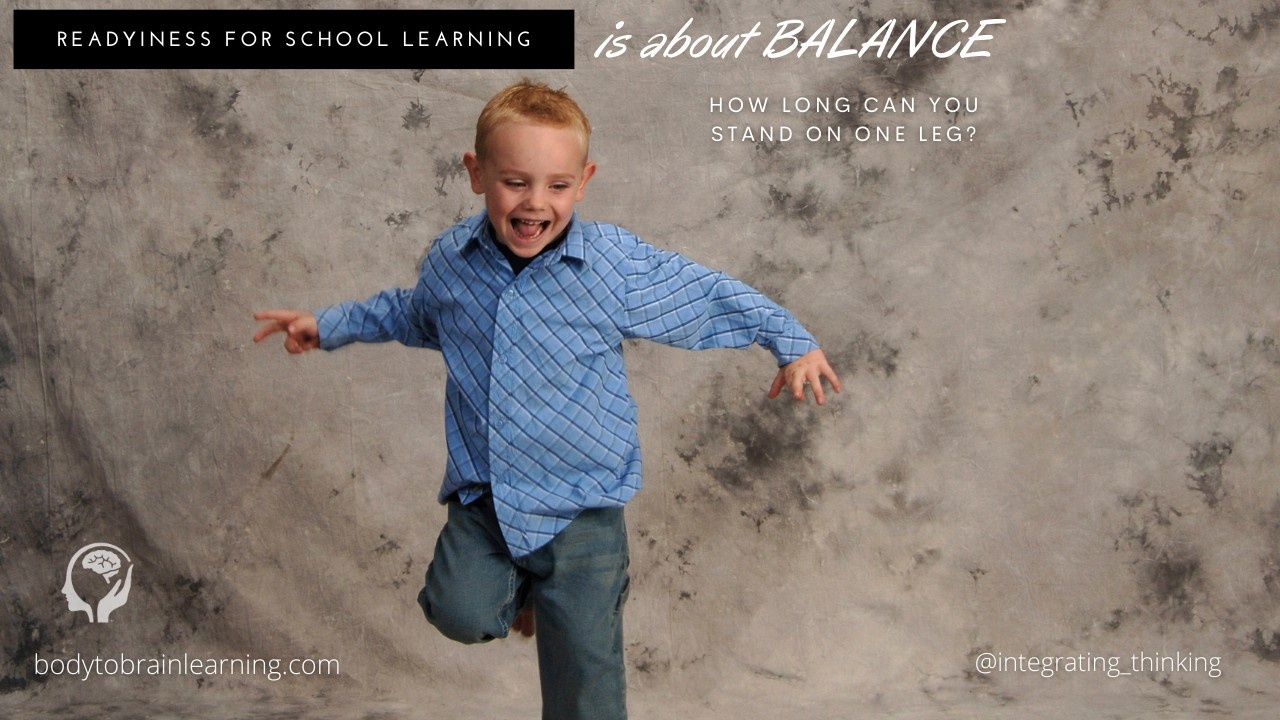There's a story I've been told (I'm sorry I can't cite the source or origin) where the wise person of the community decided if a child was ready to go to school and learn. The wise person asked the child to stand on one leg. If the child could balance well for the appropriate length of time, the wise person would agree, the child was ready for learning and should attend school. If not, the child needed more time to develop the stability and body maturity to support the learning required for school entry. They needed more physical play opportunities to mature their balance system.
An ability to balance, control the body and sustain stability is crucial for learning.
Our balance and postural control provide the foundations for all of our physical requirements for learning.
Balance problems (particularly in stationary positions) can be seen in:
👉 coordination difficulties,
👉 eye movement control (which affects how we interpret and process what we see, our visual perception)
👉 sense of direction difficulties,
👉 disorientation,
And more.
The physical challenges associated with immature balance systems impacts our ability to learn academically. It's hard to learn to read and write. It's hard to sit still.
If our body is challenged by balance issues, we expend energy on establishing a sense of stability and we have less brain energy for academic learning. Focussing on letters and using smooth eye movements to read effectively can be difficult.
Sometimes readers with balance and eye coordination issues feel like the print in their reading material is "swimming" or moving, or it changes in front of their eyes. That's really challenging for learning success. That can be associated with immature balance systems.
Establishing and maintaining static balance to support academic learning is dependent on mature and integrated proprioceptive, visual and vestibular sensory systems. Those systems take time to mature, and if a child/student has immature proprioception, vestibular function and immature visual coordination and processing systems, they probably aren't ready for the requirements of an academic learning situation.
Fortunately, we can utilise neurodevelopmental approaches to identify and address these immature systems. Fortunately, the brain is flexible enough to change, rewire and reconnect our neural pathways, neuromotor and sensory systems to improve our learning function.
That's what neurodevelopmental therapists and educators do.
Learning readiness at school requires neuromotor and sensory maturity. If a child has learning challenges, perhaps those are associated with immature body systems and it may be worth investigating. The body that doesn't support learning, can interfere with the learning process. It's a body to brain learning connection.
Understanding and applying the Body to Brain Learning™ process helps students and teachers attain better academic learning outcomes. It impacts wellbeing at school and can help support neurodiverse students and those who work with them. It also assists those who are underachieving academically and are experiencing learning challenges because of neuromotor and sensory immaturity.
LEARN MORE and STAY INFORMED
If you would like to learn more about the Body to Brain Learning™ process and join in the conversation, then sign up for regular updates, training information and other 'neuro-nerd' learning facts using the button in the section below.
You can also follow us on Facebook, Instagram and Linked In. Please join in the conversation there. Body to Brain Learning™ is part of Integrating Thinking Neurodevelopmental Education Consultancy.
Dr Christine Payard (PhD) is a Neurodevelopmental Educator, founder of the "Body to Brain Learning™ Professional Development Series", Director of "Integrating Thinking" and the INPP Australia Principal.
She is an experienced teacher, a passionate educator who could talk all day about learning, how we learn, the body, the brain, and a functional and developmental approach to learning.
Learn more:
www.bodytobrainlearning.com
www.integratingthinking.com.au
www.inppaustralia.com.au
Stay connected with news and updates!
Join our "Integrating Thinking" and "Body to Brain Learning" mailing list to receive the latest news, updates & training information from us.
Don't worry, your information will not be shared with others.
We HATE spam, so you won't be inundated with emails from us.



